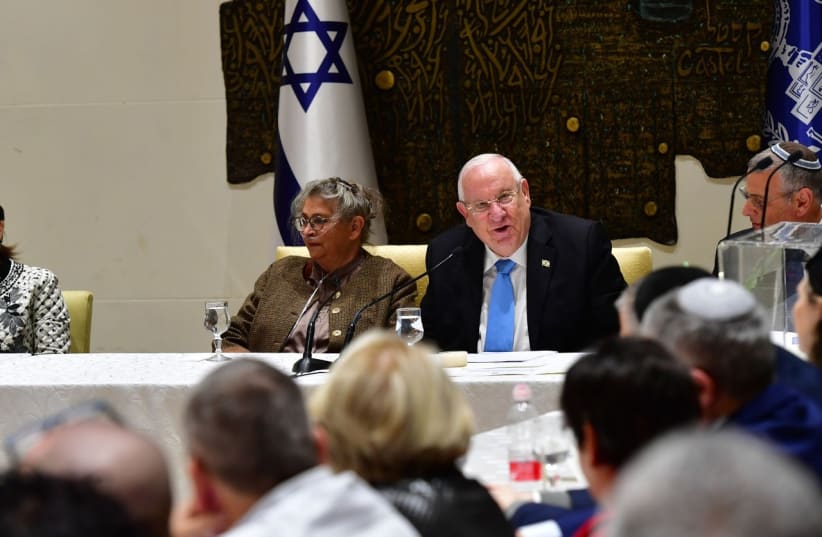Debate, dispute, division, dialogue and conflict were all under discussion at the Bible study group session with President Reuven Rivlin on Sunday night, together with the President of the Supreme Court Esther Hayut, legalists, rabbis, academics and politicians.
The event, which was coordinated by the 929 Bible Study Group and the Pardes Center for Judaism and Conflict Resolution, comes at the end of the Pardes Institute’s week of events for its 9 Adar initiative designed to find ways to engage more constructively in polarized ideological and political debates.
Speaking at the event, Rivlin said that there is “nothing more Jewish than pointed disagreement” and “nothing more democratic than pointed disagreement,” and noted that this concept was relevant in the run-up to the elections.
Seemingly in reference to the battle for the center ground in Israeli politics, Rivlin noted the temptation “to avoid real, painful, pointed encounters,” or to create “a false reality where we are all the same, to blur the edges, to melt everyone into a single bloc, or... to present the world as if there is only black and white.”
“If we build roads to bypass encountering the other, if we continue to ignore the power of disagreement, of what it can bring forth, we will miss out on the most important way of understanding ourselves, the president said.”
Hayut noted that the inclination of two parties on opposing sides who insist that every one of their arguments is critical, therefore making any concession impossible, reduces the chance of reaching a solution.
“When sides come to a compromise agreement in a legal matter it is generally the result of their willingness to prioritize what comes first, and it is this willingness that often paves the way to find creative solutions to a disagreement that benefit both sides,” she noted.
Rabbi Dr. Daniel Roth, the Director of the Pardes Center for Judaism and Conflict Resolution, spoke of how the Bible and its numerous commentaries can be used to understand how two separate parties can understand the same events in totally different ways.
“The model of the Jewish beit midrash (study hall) and the concept of ‘disagreement for the sake of Heaven’ cultivates our minds to be skillful interpreters of the many conflicting realities of the texts,” said Roth.
“We believe that this methodology of learning texts can be also applied to the study of history, conversations over social media and the news. This is absolutely critical for strengthening the eroding culture of civil discourse and constructive disagreement in the world today,” he shared.
There is nothing more democratic than disagreement and a culture of discourse. But firstly, disagreement itself is needed. Tonight we hosted the 22nd Bible Study Group of @929 from the perspective of Israeli society, on 'The Power of Disagreement and the Culture of Discourse' pic.twitter.com/ydVnvyOMpG
— Reuven Rivlin (@PresidentRuvi) February 17, 2019
Ahead of the 9Adar initiative this year, Roth and Pardes launched a new project entitled “Mahloket Matters: How to Disagree Constructively-The Beit Midrash Way,” a five-part educational workshop series on constructive disagreement.
Designed as a customizable curriculum for educators and lay leaders to use, some 20 different Jewish communities and communal groups in the US and UK engaged in this workshop using the contradictory interpretations of Biblical narratives about conflict to educate towards a more constructive debate and dialogue over political and ideological conflicts.
“As an open, non-denominational institution, constructive disagreement is something that Pardes has been practicing and promoting for decades,” said Rabbi Leon A. Morris, President of the Pardes Institute of Jewish Studies.
“This value is relevant in ways it has never been before. People often are enclosed in like-minded groups, unable to engage those with whom they disagree in respectful conversations. This is a moment when we have the duty to share these concepts with the world at large.”never been before. People often are enclosed in like-minded groups, unable to engage those with whom they disagree in respectful conversations. This is a moment when we have the duty to share these concepts with the world at large.”
